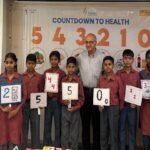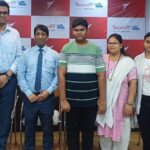New Delhi, August 06, 2021:
According to the “Tracking universal health coverage: 2017 global monitoring report” by the World Health Organization and International Bank for Reconstruction and Development, in India alone, about 50-60 million people in the last decade have been pushed to poverty because of health-related expenditure[1]. The poor lose up to 1-2 months of productive time in a year to illness of self and family. Almost 50-80% of them live with some form of undiagnosed illnesses and die earlier than those who are economically better off[2]. To address this issue and break the vicious cycle of ill health and poverty, Swasti’s Invest for Wellness (i4We) programme has brought primary care to the doorstep of 2 lakh+ of the poorest and most marginalised people. Their aim is to reach 100 million well-thy days[3] by the year 2030.
The programme is currently being implemented across 4 States and 5 locations in urban and rural areas in India – Sehore District (2 blocks) in Madhya Pradesh; Ramanagara District (1 taluka), , and Bengaluru urban district in Karnataka; Karur urban in Tamil Nadu; and Gurugram in Haryana. The model is designed to have local community leadership through not just frontline health workers, but through health focused groups and a local community institution, equivalent of the Mahila Arogrya Samiti. Each family is a “member” and actively participate in their well-being journey, actively being navigated through health information, advice and services (screening, treatment and care services and referral) , social protection (awareness,eligibility and facilitation of government identity and schemes) as well as financial literacy and services (savings and credit).
As a response to COVID-19, the community leaders prevented the spread of the virus among their members by conducting surveillance, providing local support and advice, reinforcing safety protocols and behaviours, offering telecare services for home isolation, chronic conditions as well as facilitating vaccination drives. Community leaders worked alongside staff from Swasti to follow-up with families during COVID-19 and support access to rations, medications, govt services, hospitalization and oxygen support.
Best described as a system innovation in primary healthcare, i4We combines health and wealth interventions, and focuses on well-being for the most poor and marginalized communities. It was incubated by the Catalyst Group – a 26-year-old social impact platform, working in the spaces of social and economic development as well as humanitarian emergencies. Sister organizations of the Catalyst Group are CMS – social impact specialists, Swasti, The Health Catalyst – a Global South public health non-profit, Vrutti – Livelihood Impact Partners were instrumental in bringing i4We to life. It is being supported by various partners in different locations including flagship partner – Marks & Spencer and others like Migros, Levi Strauss & Co., Social Venture Partners, Morgan Stanley, Ashraya Hastha Trust, PCMH Restore-Health, PCI 360 etc.
Shiv Kumar, the co-founder of the Catalyst Group and Chief architect of i4We, said, “i4We uses a strong technology strategy which includes an app for the health facilitator, nurse, and the healthcare provider network, real-time analysis and dashboards for action, point of care diagnostics, and a range of innovative health products. It also uses the latest behavioral science theory and practices including survival analysis, nudge, and other tools.”
Describing their experience, Puja Devi, President of Sanjeevani Kalyan Samiti, Mohammadpur-Jharsa says, “We save about Rs, 200 per month in our own accounts which earns interest. Every family gets a variety of benefits ranging from screening, treatment, care, health education and advice, low-cost credit and opportunities for training and livelihood. We work to help families take charge of their health – from what they eat, their emotional health, solving problems or working through them. When we work together, we can move forward faster”
Health outcomes cannot be guaranteed with a linear approach. For the vulnerable, unless crucial challenges such as financial security and protection are ensured, health for all will continue to remain a pipe dream. And therefore, it is imperative that public health solutions are designed to address challenges beyond just the obvious. The i4We model demonstrates one such holistic approach, that supports people navigate their health journey, towards well’thy days.
healthysoch







